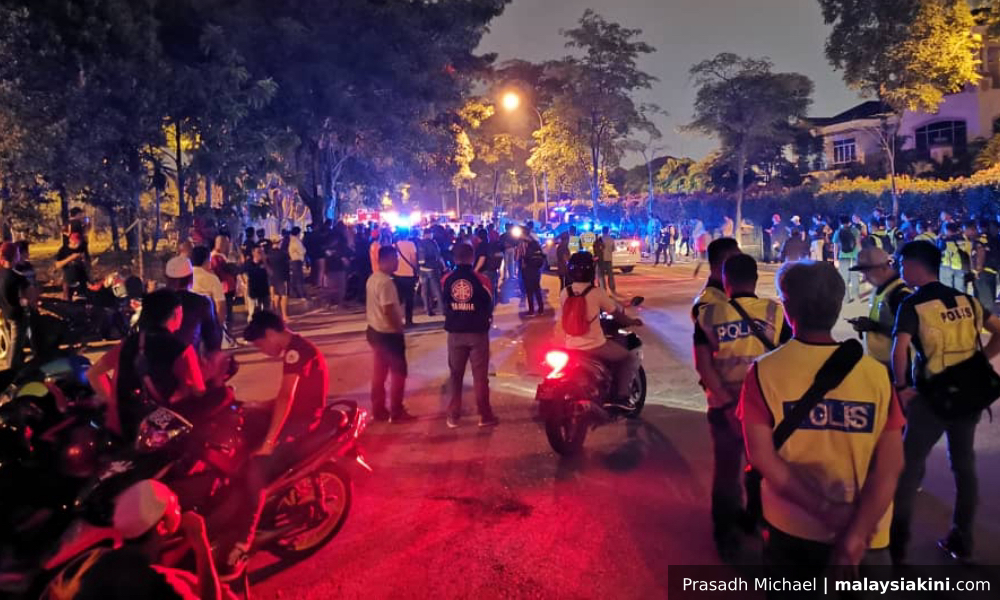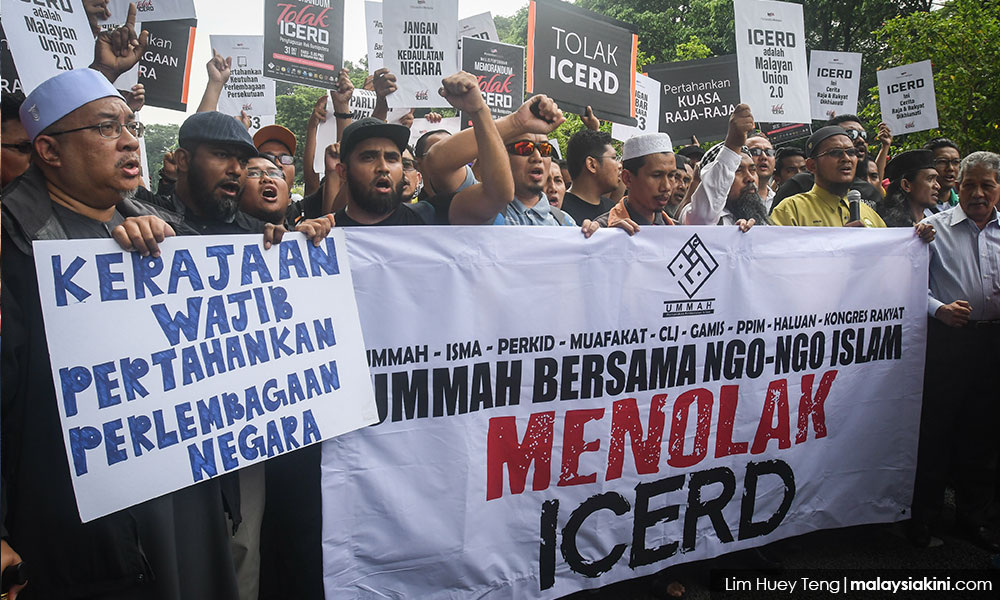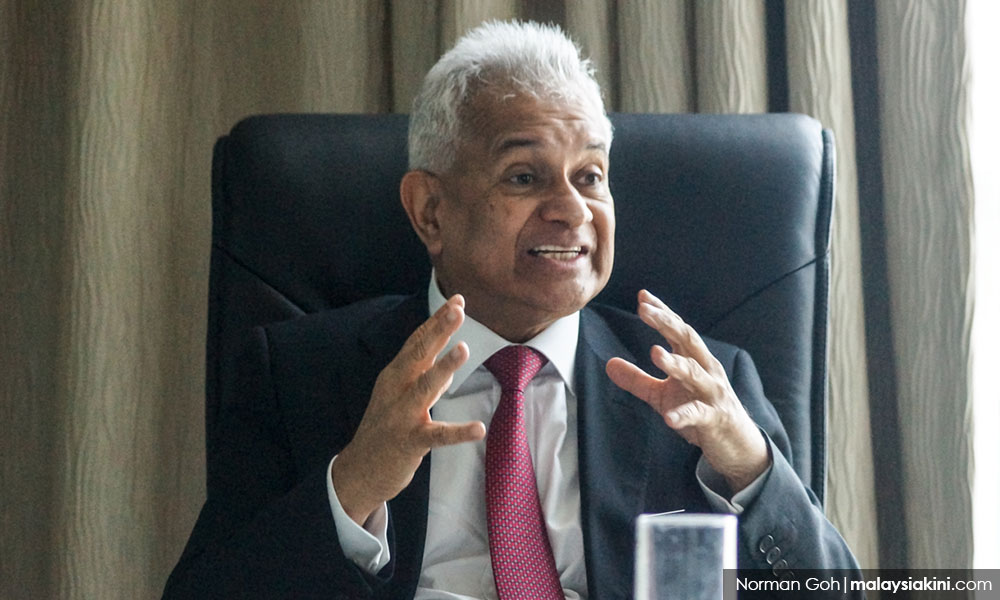
QUESTION TIME | A couple of incidents recently have raised racial tensions. These are being used by the unscrupulous to fan the flames of enmity among the races so as to make themselves look like champions in the eyes of their own community.
The International Convention for the Elimination of all forms of Racial Discrimination or Icerd was not ratified probably because of gangster politics by Umno-PAS, despite a previous commitment announced by the prime minister at a recent United Nations meeting.
There were threats of violence, even another May 13, despite the fact that ratification will have no impact on special privileges of bumiputera, including those of Malays. This indicates gross misinformation, with the government buckling to intimidators and making no attempt to explain that Icerd will not affect the special privileges.
Former home minister Ahmad Zahid Hamidi said Malays will go amok. Zahid has confessed links to Malay gangs before, referring to them as “our people”.
And then came the temple riots - started when 50 Malay youths rampaged inside a Hindu temple. Home Minister Muhyiddin Yassin said a group of Malay men were hired by lawyers acting for the developers but the lawyers and developersdenied involvement.
So who was behind this Malay group? A fireman was badly injured, a rather regrettable incident. Both events resulted in needless ratcheting up of racial tension.
But with a new government installed more than half a year ago, one hopes that this politics of stoking race and religious hatred is handled much better in future. The solution is rather simple. All it requires is the political will to reduce racial tension, which the previous government did not have but instead used division to garner support for itself.
Historical problem
If the new Harapan government is committed to increasing racial harmony, and one assumes it does, here are 10 things it should do.
1. Identify the root source of the problem. The immediate root cause of tensions over the temple issue was the rampaging of 50 Malay youths in the temple who took the law into their own hands. Still, it does not justify the subsequent rioting. The longer-term one is the historical problem of Hindu temples without titles, which has not been sorted out to date.
2. Seek ways to solve it at the source. Once the source is identified, it becomes easier to solve the problem. Ensure through the police that all thugs are kept out of any potential racial problem. For long-term issues such as titles, facilitate these for old temples and put in place an approval process for the setting up of not just new temples but all places of worship.

3. Give reasoned information to de-emotionalise the issue. When some issues get emotionalised, it is the duty of the government to cool things down through basic, reasonable information which addresses the concerns of all communities involved. For instance, over the Icerd issue, it should be pointed out that bumiputera privileges are not affected and a condition for signing can be that the Malaysian Constitution is supreme.
4. Ensure investigation by police is impartial, proper and honest. To prevent escalations, impartial investigation is necessary. Call a crime a crime and treat all criminal actions equally. No one should be allowed to break the law, and no justifications for that should be made.
In the past, investigations by the police have not always been impartial because of the alignment of thugs involved with the ruling party, particularly Umno. They were used to disrupt meetings and forums organised by groups thought to be unfriendly to the government. This has to change for all to regain confidence in the impartiality of the police.
5. Set up the Independent Police Complaints and Misconduct Commission (IPCMC) to oversee police impartiality. The IPCMC, as originally envisaged, should be set up to investigate possible police misbehaviour and will provide greater confidence in the police force in the future.
6. Be firm, quick and fair in all actions. It is necessary that quick action is taken to snuff out any rioting and criminal action so as to prevent escalation. Any complaint of slow police action should be investigated quickly and proper explanations must be made and/or remedial action should be taken.
7. Stick to the law. The government should be firm about taking action and all those who take the law into their hands should be dealt with seriously. Courts should take seriously incidents that can cause public disorder and mete out heavy sentences to those involved. For the temple issue, due consideration should be given to the proposal by attorney-general Tommy Thomas to mediate under Section 9, Act 349 Government Proceedings Act 1956.

Thomas (photo) noted that the underlying dispute arises from a consent order in court. In a situation like this, the AG may institute a suit to help settle disputes involving public, religious, social or charitable institutions. This may well be the best way to settle the dispute in a peaceful, amicable way in accordance with the law, without ratcheting up further racial tension.
8. Come down hard on those who incite violence and hatred. Politicians will be politicians, but to allow them to run rampant and incite violence and hatred is dangerous and against the law. There are enough provisions in criminal law to prosecute them.
9. Keep thugs and gangsters out. Ensure enforcement only through the police. The enforcement authorities such as the police should be in charge of enforcing court orders, with some restraint and a reasonable time given to remove property and relocate occupants on humanitarian grounds. On no account should others, and especially thugs, take this role.
10. Don’t use the Sedition Act. It is a matter of great concern that the cabinet has allowed the Sedition Act to be used over the temple issue. That act is a very draconian and a repressive one first enacted during the communist problems and used by the previous government extensively over the years to stifle dissent and debate.
In fact, there are many provisions in criminal law to deal with this situation. Remember, Harapan has said in its manifesto that the Sedition Act is one of those oppressive laws that will go.
Most of all, the new Harapan government must free itself of the fetters of BN and make the necessary changes to reduce racial tension by reining in those who want to gain support among their communities by inciting violence and hatred against other communities.
This is proving to be difficult, for Harapan component Bersatu is itself a relic of Umno. But if there is a clear message that the government is prepared to do that, racial tension will reduce and the path to greater racial harmony will be lit.
P GUNASEGARAM still hopes that Harapan can do much better than Umno/BN. E-mail: t.p.guna@gmail.com - Mkini



No comments:
Post a Comment
Note: Only a member of this blog may post a comment.